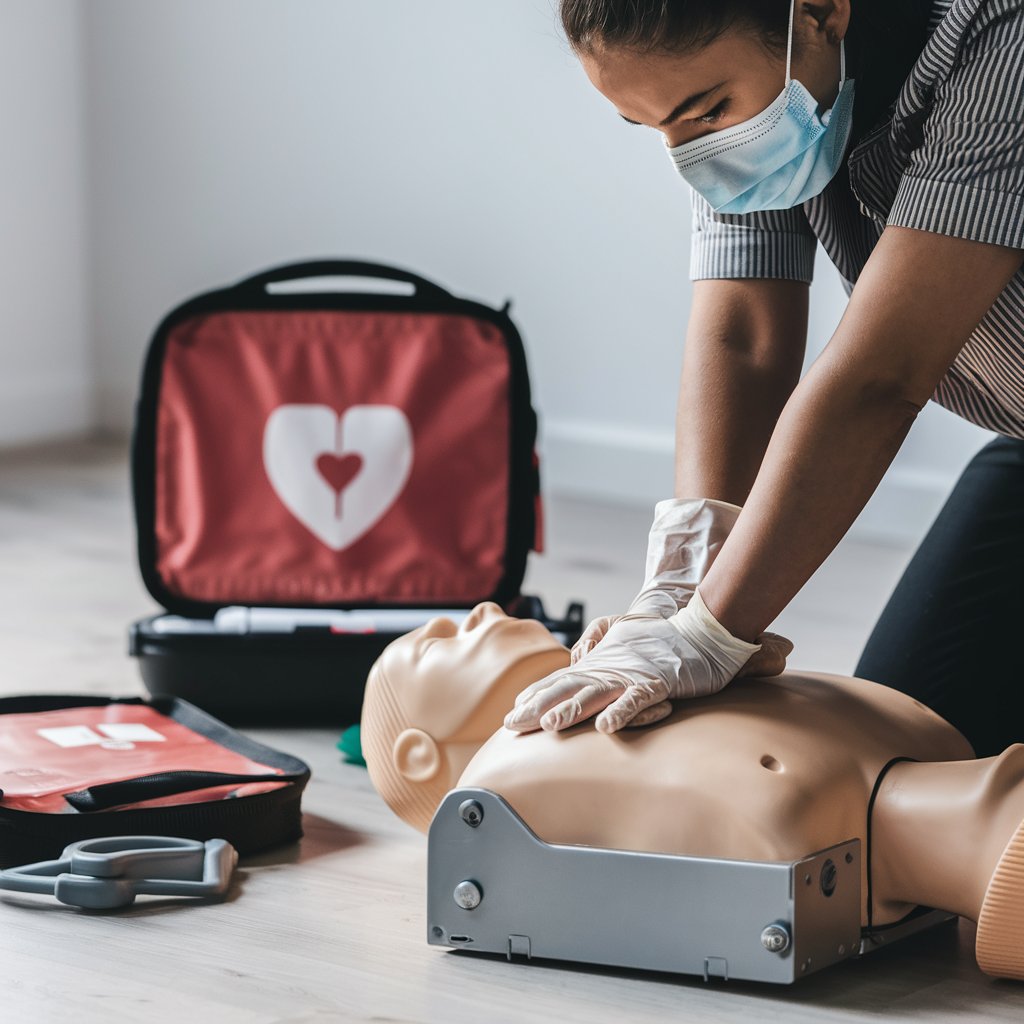First Aid CPR Training is a critical skill set that can save lives in emergencies. Whether you’re a healthcare professional, a teacher, or simply a concerned citizen, being trained in CPR and first aid is invaluable. This blog will explore the essential tips for effective First Aid CPR Training, why it’s important, what it involves, and who benefits from it. We’ll also highlight the Heartsaver CPR AED courses offered by CPR with Dr. L.
Why First Aid CPR Training is Crucial
Immediate Life-Saving Skills
Emergencies can happen at any time, and knowing how to respond with CPR and first aid can mean the difference between life and death. Immediate intervention can stabilize a person and increase their chances of survival until professional help arrives.
Reducing Panic in Emergencies
Proper training equips individuals with the knowledge and confidence to handle emergency situations calmly and efficiently. This can significantly reduce panic and improve the overall response.
Promoting Safety in Communities
First Aid CPR Training promotes a safer environment in communities and workplaces by ensuring that more people are prepared to handle emergencies.
What First Aid CPR Training Entails
Comprehensive Curriculum
A thorough training program covers a variety of essential topics, including:
Cardiopulmonary Resuscitation (CPR): Techniques for adults, children, and infants.
Use of Automated External Defibrillators (AEDs): How to effectively use AEDs during cardiac emergencies.
Basic First Aid: Managing injuries like cuts, burns, fractures, and sprains.
Medical Emergencies: Recognizing and responding to heart attacks, strokes, seizures, and allergic reactions.
Choking Relief: Techniques for adults, children, and infants.
Hands-On Practice
Effective training includes hands-on practice with manikins and AEDs to build muscle memory and ensure confidence in performing the necessary skills.
Who Benefits from First Aid CPR Training
Healthcare Professionals
Regular training ensures healthcare providers are up-to-date with the latest techniques and prepared to handle emergencies both in clinical settings and the community.
Educators and Childcare Providers
Teachers, coaches, and childcare workers benefit greatly from being trained in CPR and first aid, as they are often the first responders in emergencies involving children.
Parents and Caregivers
Training equips parents and caregivers with the skills needed to respond to emergencies involving children, providing peace of mind and ensuring a quick and effective response.
Workplace Safety Officers
Safety officers in various industries play a crucial role in maintaining workplace safety. First Aid CPR Training enables them to respond effectively to workplace injuries and medical emergencies.
10 Essential Tips for Effective First Aid CPR Training
Choose Accredited Training Programs
Ensure that the training program you select is accredited by recognized organizations such as the American Heart Association or the Red Cross. Accredited programs ensure high-quality training that meets industry standards.
Engage in Hands-On Practice
Hands-on practice is crucial for effective learning. Make sure your training program includes plenty of practical exercises with manikins and AEDs to build muscle memory and confidence.
Regularly Update Your Skills
CPR and first aid techniques evolve. Regularly update your skills through refresher courses to stay current with the latest guidelines and best practices.
Understand the Importance of AEDs
Learn how to use Automated External Defibrillators (AEDs) effectively. AEDs are critical in responding to cardiac emergencies, and knowing how to use them can save lives.
Practice Situational Awareness
Situational awareness is key in emergencies. Training should include scenarios that teach you to assess your surroundings quickly and accurately to ensure a safe and effective response.
Learn to Recognize Medical Emergencies
Understanding the signs and symptoms of common medical emergencies like heart attacks, strokes, and allergic reactions is essential. Training should cover how to recognize these conditions and respond appropriately.
Emphasize Communication Skills
Effective communication is vital during emergencies. Training should include exercises that improve your ability to communicate clearly and calmly with victims and bystanders.
Stay Calm Under Pressure
Panic can hinder your ability to respond effectively. Training should include techniques for staying calm under pressure and maintaining focus during emergencies.
Prioritize Personal Safety
Your safety is paramount. Training should emphasize the importance of assessing the scene for hazards and ensuring your safety before assisting.
Encourage Continuous Learning
First aid and CPR skills require continuous learning and practice. Encourage ongoing education and participation in advanced courses to enhance your skills further.
The Heartsaver CPR AED Courses by CPR with Dr. L
Why Choose Heartsaver CPR AED Courses?
The Heartsaver CPR AED courses offered by CPR with Dr. L provide comprehensive training in CPR and AED use for both lay responders and healthcare professionals. These courses are designed to equip participants with the skills and confidence to handle cardiac emergencies effectively.
What the Courses Cover
Adult, Child, and Infant CPR: Techniques for CPR on individuals of all ages.
Use of AEDs: Hands-on training in using AEDs during cardiac emergencies.
First Aid Basics: Managing common injuries and medical emergencies.
Choking Relief: Techniques for relieving choking in adults, children, and infants.
Flexible Learning Options
CPR with Dr. L offers flexible learning options, including in-person, online, and blended formats, making it accessible for everyone regardless of their schedule.
Certification and Recertification
Upon completion, participants receive a certification valid for two years. Regular recertification ensures that skills remain current and effective.
Effective First Aid CPR Training Transformation
Effective First Aid CPR Training is a crucial skill that can save lives. By following these essential tips and participating in accredited training programs like the Heartsaver CPR AED courses offered by CPR with Dr. L, individuals can build the confidence and competence needed to respond effectively in emergencies. Continuous learning and practice are vital to maintaining these life-saving skills and promoting a safer environment.








